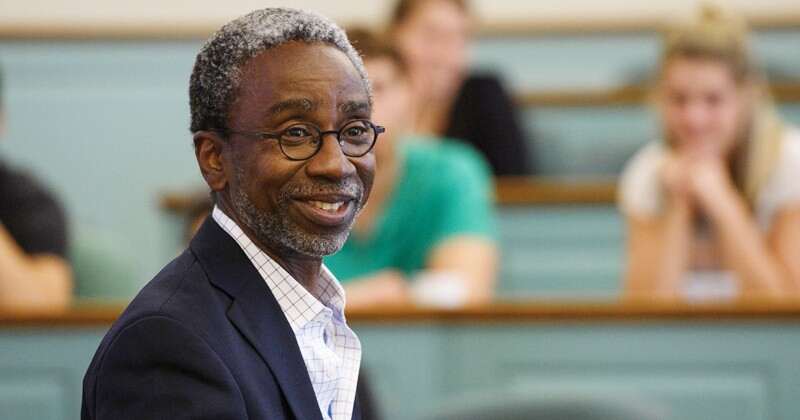This photograph was taken before the coronavirus pandemic necessitated health measures such as wearing masks and social distancing. Babatunde Ogunnaike, the William L. Friend Chaired Professor of Chemical Engineering and former Dean of the College of Engineering at the University of Delaware, is the newly appointed director of the Grand Challenges Scholars Program.
Former Engineering dean takes the helm of UD’s Grand Challenges Scholars Program
For engineers, the ability to understand and solve a wide range of technical problems is only one part of the job, said Babatunde Ogunnaike, the William L. Friend Chaired Professor of Chemical Engineering and former Dean of the College of Engineering at the University of Delaware.
“Engineers usually display a curiosity about the principles behind how things work: how automobiles move, how air conditioners and refrigerators cool, and how to build and design bridges and such things,” said Ogunnaike, a member of the National Academy of Engineering. But there’s so much more to engineering than problem solving. “If you’re solving problems for humanity, then you better know something about the humanity for which you’re solving the problem.”
In other words, there’s a very important social aspect to engineering, what Ogunnaike calls the “societal component,” or issues involving culture, politics or psychology, which are where many engineering projects falter because the public is not receptive to change.
“We have serious issues with global climate change, and engineers have developed technically feasible solutions, some of which are even financially viable, but what’s holding back progress is society,” said Ogunnaike. “There are some people for whom none of this is real, and we can’t sit here as engineers and point fingers. We’re all living in this world together, so it is our job to figure out a way to get through.”
As the newly appointed director of the Grand Challenges Scholars Program at UD, Ogunnaike wants to encourage students to broaden their understanding of what it means to be an engineer.
The Grand Challenges Scholars Program (GCSP) provides a framework for UD engineering undergraduate students to focus on academics and extracurricular activities that immerse and engage them in the most pressing issues facing humanity, including climate change and renewable green energy, cybersecurity, virtual reality, improving urban infrastructure and engineering better medicines, to name just a few of the research focus areas suggested by the National Academy of Engineering.
Previous Grand Challenge Scholars at UD have prototyped a kinetic energy harvesting system, designed and fabricated a portable decontamination system for visiting veterinarians for the USDA, designed a new water filtration system in a rural village in South America, and conducted workshops at local middle and high schools to promote the mechanical engineering profession.
For senior Rebecca Clements, a biomedical engineering major who is researching the human brain at the Mechanical Neuroimaging Lab under assistant professor Curtis Johnson, GCSP was a chance for her to work on exciting projects that will positively impact people’s lives.
“I really liked the idea of being involved in a program that could guide me through college and provide a framework for different activities and research opportunities,” said Clements, who is working on a senior thesis project that aims to predict brain aging using artificial neural networks, a form of machine learning that mimics biological neural networks in human brains. “Brain age is essentially a measure that shows how your brain compares to a typically developing brain of a person your age. So a person with a neurodegenerative disease like Alzheimer’s is experiencing brain aging that is beyond their chronological age.”
GCSP at UD is similar to a minor course of study designation. Students may apply at the time of admission or may elect to join GCSP any time before the beginning of the final academic year of their undergraduate degree program so as to allow for a full academic year to complete the program requirements and participate in the GCSP community. The deadline for applying for the program is March 25 and admitted students can access the application via their My Blue Hen Home student portal.
“There are many engineering students out there who want to make a difference, and when you give them an opportunity, they will come to a place like UD,” said Ogunnaike, who is also a member of the provisional committee for the National Academies of Sciences, Engineering, and Medicine’s Board on Chemical Sciences and Technology’s new three-year study: “Chemical Engineering in the 21st Century: Challenges and Opportunities.”
One of those engineering students who chose UD because of GCSP is Tori Reiner, a biomedical engineering major with research interests in cellular engineering. Reiner applied to several universities but wasn’t sure which would be the best fit. Getting into GCSP made the difference because, in her words, she “wanted to change the world.”
“This program has opened my eyes to what I can do with my life,” said Reiner. “The engineering faculty in the GCSP want you to succeed.”
As the new director of GCSP, Ogunnaike hopes to expand learning and research opportunities for students, including a distinguished lecture series where engineers can come to UD and talk about their experience addressing the grand challenges facing our world.
“Our students will see that things don’t change unless people make them change,” said Ogunnaike. “Let’s go change the world together.”
(featured on UDaily, 03/17/2021)

